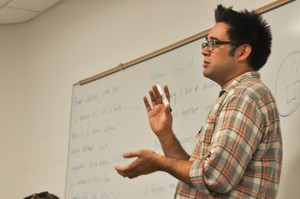Jason Brian Santos believes you can’t fix young adult ministry until you fix the church.
The coordinator of collegiate, young adult, and youth ministries for the Presbyterian Mission Agency told a Big Tent 2015 gathering on young adult faith formation that American youth have a dominant new religion.
“It’s something called Moral Therapeutic Deism,” he says, referencing Christian Smith’s groundbreaking research in the National Study of Youth and Religion.
“The majority of college students believe religious institutions are there to give them morals, to make them feel better about themselves—but they’re not concerned with the things of God who is kind of like a butler in the sky to them.”
Santos explained how young adults age 18-35 came to view the mainline church this way. He says the silent generation, born 1921-1941, is very moralistic, for them being Christian was part of a civil life. Boomers, born 1941-1961, are very therapeutic, coming of age in the sixties, during the social and sexual revolution pop psychology boomed. Generation X, born 1961-1981, is very deistic.
“We were raised by Sesame Street,” he says. “We put God out there [in the sky.] Our parents abandoned us, why would God care?”
The National Study of Youth and Religion also found the majority of youth—including millennials, born 1981-2001—who have been raised by technology, have a lack of vocabulary when it comes to faith. Institutional religion just isn’t important to them.
“I would argue most adults don’t know how to communicate about faith, which is why faith stories are so huge,” Santos says. “Figure out how to tell your own faith story—from the time you were born to now—let young adults hear about the ups and the downs, about both the ‘oyster times’ and the ‘times of despair.’”
When Santos was ordained he had children and teenagers distribute the communion elements. After the service, a woman came up and told him when she saw that she would be taking the Lord’s Supper from a child, she felt that it wasn’t right. But then she heard the voice of seven-year-old boy saying, “This is Christ’s body broken for you.” In that moment, the woman told Santos that, “the Holy Spirit of God came upon her,” changing how she viewed children and teens participating in worship.
“Children sit in classrooms six hours a day, why can’t they sit in church for one hour and participate in worship—intergenerationally?” asked Santos. “That’s how beliefs are formed. If we pray with them, they learn how to pray. Get your kids, your little kids, and have them draw where they felt God’s presence. Don’t just have a youth Sunday that sets them apart—have them with you in weekly practice in your larger faith community.”
Because religion hasn’t made a significant difference in their lives in high school, Santos says freshman in college will “fill their days with anything,” and won’t return unless something bad happens—even then they might just wait until things get better.
“Campus ministers are kind of like that last frontier,” he says. “Unless we reach out and grab them, once they leave college they might not return.”
“We must push past our faith just being for a moral relationship. Create space where our kids who don’t know what they believe—or who they are—can express their doubts in an authentic faith community.”

